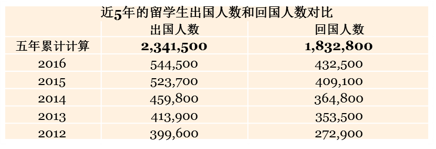尊敬的用户您好,这是来自FT中文网的温馨提示:如您对更多FT中文网的内容感兴趣,请在苹果应用商店或谷歌应用市场搜索“FT中文网”,下载FT中文网的官方应用。
RETURNING TO THE LAND OF OPPORTUNITIES, AND FIERCE COMPETITION: HOW TO JUMPSTART A CAREER IN CHINA
如何在机遇与竞争并存的中国更快进阶职场
Between a perceived glass ceiling overseas and intense job competition in China, many Chinese who have gone to university or graduate schools abroad are discovering that desirable employment is not that easy to come by.
面对国外求职的潜在天花板障碍、国内就业市场的激烈竞争,海外留学生开始发现,不管身处何处,求得一份理想工作都不简单。
With a surprisingly robust GDP growth of 6.9% in Q1 2017, the largest increase in the past year and half, many global investors are bullish on the Chinese economy as it shifts away from export-led manufacturing. Powered by government investment in crucial technologies and industries, such as clean energy, advanced materials and the like, China is on the threshold of a game-changing transition to become the world’s leading economy. Coinciding with an overseas backlash against the globalization that has underpinned China’s past thirty years of economic development, this vision of China’s dynamism is attracting returnees and foreigners alike to build a career in China.
中国经济发展强势增长,2017年首季GDP增长6.9%,是近一年半来最大升幅。目前中国逐渐降低对出口导向制造业的依赖,许多全球投资者对中国经济更为看好。中国政府大力推进对清洁能源、先进材料等重点科技行业的投资,助力中国经济完成重大转型并跃身引领全球经济。在其它国家开始对全球化持怀疑态度、逐渐减缓发展脚步的当下,拥有发展雄图及动力的中国,更吸引了大量海外留学生和国外职场人士。
“我身边的大多数留学生朋友都选择回国发展,我们都看好中国发展潜力和机遇,”就读于美国俄亥俄州立大学的戴嘉本(音译),在接受《人民日报》采访时如是说。戴的同学也对自己能回国对祖国发展有所贡献感到骄傲。
According China’s Ministry of Education, more than 4 million Chinese nationals studied abroad from 1978 to 2016. 2.2 million of them have since returned to China, with the pace of return accelerating in the past few years. The Chinese government since 2012 has increasingly promoted favorable policies for bringing “overseas talent” back to China. Many Chinese students never really adjusted to the cultural or linguistic environments in their host country. China’s continuing high economic growth has created a sense of dynamic professional opportunities. It is no wonder that more and more Chinese professionals are opting to return to their native land.
根据中国教育部统计,超过四百万名中国学生在1978年到2016年间远赴海外留学。当中二百二十万人已经回国,留学生归国人数增长幅度近年显著上升。许多留学生不习惯海外文化、语言环境,回国意愿高;同时,中国经济高速增长下带来大量工作机遇,中国政府更从2012年起推行的各项优惠政策,越来越多中国籍专业人才选择洄游中国市场。
But, according to a report on overseas returnees published at the end of 2016, more than 60 percent of those who have found jobs work in lower than desired positions with salaries that fall short of their expectations. The large number of returnees have similar backgrounds and are similarly competitive. They are all seeking jobs in first-tier cities, as are the millions of domestic college graduates, and thousands of people apply for every advertised position. Unlike even ten years ago, it is difficult to distinguish oneself from the competition. Returnees also suffer from having to adapt to a business and work environment that is very different from when they left. Domestic graduates remained embedded in local networks and retain familiarity with the Chinese environment.
“海龟”和中国对管理人才的需求

根据2016年出版的一份有关归国留学生的调查报告显示,超过六成就职人士认为其工作职位和待遇与预期中有落差。大多数归国留学生拥有极其相似的专业背景与竞争力,又多数希望能在一线城市工作,这意味着他们不得不和上百万个国内本科生一同竞争于国内职场,每一个职位空缺都有几千人报名申请已经成为市场常态。这一远比过往更严峻的求职环境,使得拥有海外留学背景的求职者不再具有优势。比起熟悉当地环境和人脉的国内毕业生,归国留学生必须重新面对全新商业环境带来的挑战。
A CEO survey conducted by PwC (January 2017) found that 77% of CEOs interviewed worry that skills shortages could impair their company’s growth. And they say it’s the soft skills they value most that are hardest to find. Creative, innovative leaders with emotional intelligence are in very short supply. If anything, indeed, they’re even thinner on the ground than they were in 2008, when a previous survey asked a similar question, whereas people with technological skills are more plentiful than before.

In order to re-integrate, returnees will need to build their understanding of the China workplace environment and reintegrate, demonstrating local acumen as well as bringing their global acumen to the table. They will need to build their local networks quickly, and “happy hours” don’t quite do the trick. Effective networks are those that are selective and influential and accessed by means of reference from others. Returnees need to get their contacts to introduce them to relevant people. But even before that, they need to understand their needs, wants and strengths, and sharpen their relationship building skills. In short, they will need to develop a personalized strategy to access a changed China. They will need to build out contacts, build up experiences and basic skills, connect with influential professionals and influential leaders, develop self-awareness and learn how to harness their international experience to flourish in a changing China.
普华永道于2017年一月发布的年度全球CEO调查报告中显示百分之七十七受访公司CEO担心人才技能的短缺会对公司成长形成阻碍。其中,企业最看重却也最难获取的就是软技能出色的人才。由于专业技术已经普及,相对2008年的问卷回应,如今企业明显更迫切需要具有创造力、创新思维和高情商的领导人才。

想要更好的适应国内的职场环境,归国留学生必须了解并与中国的职场环境接轨,权衡和利用自己的本土经验及国际视野,并快速地建立商务人脉。“把酒言欢”的社交模式显然并不适用于商务人脉的建立,有价值有选择的人脉通常需要由身边的社交圈为你引荐,所以留学生本身也需要足够优秀来吸引优质的社交圈,并借此认识更多的职场关键人士。所以,他们需要充分了解自己的需求、目标和优势,同时磨练自己的人际关系技巧。
简言之,留学生成功洄游中国市场,需要个性化的策略以融入中国的职场环境;需要建立有效人脉,磨练经验和技能;需要发展自我认知并学习如何在日新月异的中国环境中运用自己的国际视野。
针对进阶职场中的各类挑战,职场人需要相应对策。关注了解普华永道You Plus特训计划相关内容。
